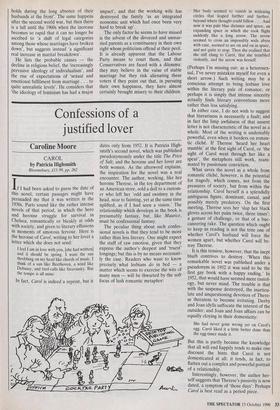Confessions of a justified lover
Caroline Moore
CAROL by Patricia Highsmith
Bloomsbury, £13.99, pp. 262
If I had been asked to guess the date of this novel, certain passages might have Persuaded me that it was written in the 1930s. Parts sound like the rather intense novels of that period, in which the hero and heroine struggle for survival in Chelsea, romantically or bleakly at odds with society, and given to literary effusions In moments of amorous fervour. Here is the heroine of Carol, writing to her lover a letter which she does not send: I feel I am in love with you, [she had written] and it should be spring, I want the sun throbbing on my head like chords of music. I think of a sun like Beethoven, a wind like Debussy, and bird-calls like Stravinsky. But the tempo is all mine.
In fact, Carol is indeed a reprint, but it dates only from 1952. It is Patricia High- smith's second novel, which was published pseudonymously under the title The Price of Salt; and the heroine and her lover are both women. As the afterword explains, the inspiration for the novel was a real encounter. The author, working, like her heroine Therese, in the toy department of an American store, sold a doll to a custom- er who left her 'odd and swimmy in the head, near to fainting, yet at the same time uplifted, as if I had seen a vision.' The relationship which develops in the book is presumably fantasy, but, like Maurice, must be confessional fantasy.
The peculiar thing about such confes- sional novels is that they tend to be more rather than less literary. One might expect the stuff of raw emotion, given that they express the author's deepest and 'truest' longings; but this is by no means necessari- ly the case. Readers who want to know precisely what lesbians do in bed — a matter which seems to exercise the wits of many men — will be thwarted by the soft focus of lush romantic metaphor: Her body seemed to vanish in widening circles that leaped further and further, beyond where thought could follow . . And now it was pale blue distance and space, an expanding space in which she took flight suddenly like a long arrow. The arrow seemed to cross an impossibly wide abyss with ease, seemed to arc on and on in space, and not quite to stop. Then she realised that she still clung to Carol, that she trembled violently, and the arrow was herself.
(Perhaps I'm missing out: as a heterosex- ual, I've never mistaken myself for even a short arrow.) Such writing may be a conscious attempt to bring lesbian love within the literary pale of romance; or perhaps it is simply that intense sincerity actually finds literary conventions more rather than less satisfying.
In either case, I do not wish to suggest that literariness is necessarily a fault; and in fact the limp awfulness of that unsent letter is not characteristic of the novel as a whole. Most of the writing is undeniably powerful, even when it borders on roman- tic cliché. If Therese 'heard her heart stumble' at the first sight of Carol, or 'the sight of Carol went through her like a spear', the metaphors still work, reani- mated by passionate conviction.
What saves the novel as a whole from romantic cliché, however, is the potential for tragedy, which comes, not from the pressures of society, but from within the relationship. Carol herself is a splendidly ambiguous figure, dominant, casual, and possibly merely predatory. On the first meeting, Therese sees her 'slap her black gloves across her palm twice, three times': a gesture of challenge, or that of a buc- caneering rake. The question which ought to keep us reading is not the trite one of whether Carol's husband will force the women apart, but whether Carol will be- tray Therese.
It is this tension, however, that the inept blurb contrives to destroy. 'When this remarkable novel was published under a pseudonym in 1952 it was said to be the first gay book with a happy ending.' In 1952, that would have seemed mere tautol- ogy, but never mind. The trouble is that with the suspense destroyed, the inarticu- late and unquestioning devotion of There- se threatens to become irritating. Derby and Joan idylls suffocate the interest of the outsider; and Joan and Joan affairs can be equally cloying in their domesticity:
She had never gone wrong yet on Carol's egg. Carol liked it a little better done than the egg-timer made it.
But this is partly because the knowledge that all will end happily tends to make one discount the hints that Carol is not domesticated at all: it tends, in fact, to flatten out a complex and powerful portrait of a relationship.
Interestingly, however, the author her- self suggests that Therese's passivity is now dated, a symptom of 'those days'. Perhaps Carol is best read as a period piece.


























































 Previous page
Previous page